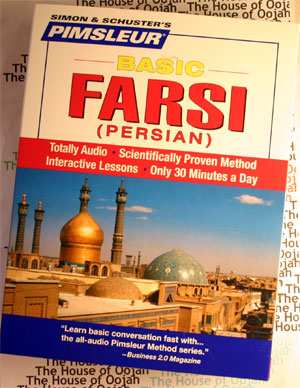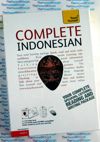Pimsleur Basic Farsi - Audio Book 5 CD -Discount - Learn to Speak Farsi - Persian

Pimsleur Basic Farsi (Persian)Audio Only 5 Audio CDs 5 CDs BRAND NEW - LATEST PIMSLEUR PROGRAM |
 |
Pimsleur Basic Farsi (Persian) - 5 Audio CDsBrand New : . 5 CDs This Basic program contains 5 hours of audio-only, effective language learning with real-life spoken practice sessions. About the Farsi (Persian) LanguagePersian (Farsi) is an Indo-European language spoken in Iran (Persia), Afghanistan, Tajikistan and Uzbekistan. It is derived from the language of the ancient Persian people. Persian belongs to the Western group of the Indo-Iranian branch of the Indo-European language family, and is of the Subject Object Verb type. Contrary to common belief, it is not a Semitic language. The Western Indo-Iranian group contains other related languages such as Kurdish and Balochi. The language is in the Southwestern Indo-Iranian group, along with the Tat and Luri languages. Persian and its varieties have official-language status in Iran, Afghanistan, and Tajikistan. According to CIA World Factbook, there are approximately 64 million native speakers of Persian in Iran, Afghanistan, Tajikistan and Uzbekistan and about the same number of people in other parts of the world speak Persian. UNESCO was asked to select Persian as one of its languages in 2006. Persian has been a medium for literary and scientific contributions to the Islamic world as well as the Western. It has had an influence on certain neighbouring languages, particularly the Turkic languages of Central Asia, Caucasus, and Anatolia. It has had a lesser influence on Arabic and other languages of Mesopotamia. For five centuries prior to the British colonization, Persian was widely used as a second language in the Indian subcontinent; it took prominence as the language of culture and education in several Muslim courts in India and became the "official language" under the Mughal emperors. Only in 1843 did the subcontinent begin conducting business in English. Evidence of Persian's historical influence in the region can be seen in the extent of its influence on the languages of Hindustani (resulting in Urdu), Kashmiri, Punjabi, Sindhi, Gujarati, Bengali and even Telugu, as well as the popularity that Persian literature still enjoys in the region. Persian, the more widely used name of the language in English, is an Anglicized form derived from Latin *Persianus < Latin Persia < Greek Πέρσις Pérsis, a Hellenized form of Old Persian Parsa. According to the Oxford English Dictionary, the term Persian seems to have been first used in English in the mid-16th century. Native Persian speakers call it "Fārsi" (local name) or Parsi. Farsi is the arabicized form of Parsi, due to a lack of the /p/ phoneme in Standard Arabic. According to Pejman Akbarzadeh, "... In English, however, this language has always been known as "Persian" ('Persane' in French and 'Persisch' in German). But many Persians migrating to the West (particularly to the USA) after the 1979 revolution continued to use 'Farsi' to identify their language in English and the word became commonplace in English-speaking countries." "Farsi" is encountered frequently in the linguistic literature as a name for the language, used both by Iranian and by foreign authors, and is preferred by some.However, The Academy of Persian Language and Literature has declared in an official pronouncement that the name "Persian" is more appropriate, as it has the longer tradition in the western languages and better expresses the role of the language as a mark of cultural and national continuity.
|
Pimsleur Basic Farsi (Persian) - 5 Audio CDs |

| Stock Info: | Out Of Stock |
| Receive In Stock Notification |

 0 Items (Empty)
0 Items (Empty)



